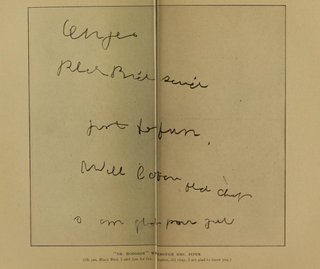Automatic writing is a claimed psychic ability allowing a person to produce written words without consciously writing.
Automatic writing may also refer to:
AT or at may refer to:
Automatism may refer to:

Surrealist automatism is a method of art-making in which the artist suppresses conscious control over the making process, allowing the unconscious mind to have great sway. This drawing technique was popularized in the early 1920s, by Andre Masson and Hans Arp.

John Anthony Frusciante is an American musician and the guitarist of the Red Hot Chili Peppers. He has released 11 solo albums and 7 EPs, ranging in style from acoustic guitar to electronic music. He was inducted into the Rock and Roll Hall of Fame as a member of the Red Hot Chili Peppers in 2012. Rolling Stone named Frusciante among the greatest guitarists of all time.

Automatic writing, also called psychography, is a claimed psychic ability allowing a person to produce written words without consciously writing. Practitioners engage in automatic writing by holding a writing instrument and allowing alleged spirits to manipulate the practitioner's hand. The instrument may be a standard writing instrument, or it may be one specially designed for automatic writing, such as a planchette or a ouija board.
Automatic may refer to:
A saw is a cutting tool.
Canvas is a heavy-duty fabric, used for making sails and as a support for an oil painting.

In the field of psychology, automaticity is the ability to do things without occupying the mind with the low-level details required, allowing it to become an automatic response pattern or habit. It is usually the result of learning, repetition, and practice. Examples of tasks carried out by 'muscle memory' often involve some degree of automaticity.

Automatic Writing is the debut studio album by American experimental rock band Ataxia, released on August 10, 2004 on Record Collection. Ataxia consisted of Red Hot Chili Peppers guitarist John Frusciante, Joe Lally of Fugazi, and Josh Klinghoffer, Frusciante's subsequent successor in the Red Hot Chili Peppers.
ATR may refer to:
Ataxia is a neurological sign consisting of lack of voluntary coordination of muscle movements that includes gait abnormality.
G11 may refer to:

Ataxia was an American experimental rock supergroup formed in 2004 by guitarist John Frusciante, bassist Joe Lally (Fugazi) and drummer Josh Klinghoffer, who later succeeded Frusciante as the lead guitarist of the Red Hot Chili Peppers until 2019, at which point Frusciante rejoined the band.
Record Collection is an independent Los Angeles, California-based music company founded by filmmaker and music manager Jordan Tappis. Record Collection is home to a diverse roster which includes music from current Red Hot Chili Peppers' guitarist John Frusciante, The Walkmen, Blake Mills, Dawes, Murs, Black Knights and management clients Blake Mills, Matt Sweeney and Fiona Apple.
Something may refer to:

Josh Adam Klinghoffer is an American musician best known for being the guitarist for the rock band Red Hot Chili Peppers from 2009 to 2019, with whom he recorded two studio albums, I'm with You (2011) and The Getaway (2016), and the B-sides compilation I'm Beside You (2013). Klinghoffer took the place of his friend and frequent collaborator John Frusciante in 2009, after a period as a touring member. At age 32, Klinghoffer was inducted into the Rock and Roll Hall of Fame with the Red Hot Chili Peppers in 2012, making him the youngest inductee at the time.
Ataxia is the sixth studio album released by the American alternative/psychedelic rock band Circus Devils on October 31, 2008. All songs on Ataxia were written and performed by Robert Pollard, Todd Tobias, and Tim Tobias.
Gothic or Gothics may refer to:
Automatic and controlled processes (ACP) are the two categories of cognitive processing. All cognitive processes fall into one or both of those two categories. The amounts of "processing power", attention, and effort a process requires is the primary factor used to determine whether it's a controlled or an automatic process. An automatic process is capable of occurring without the need for attention, and the awareness of the initiation or operation of the process, and without drawing upon general processing resources or interfering with other concurrent thought processes. Put simply, an automatic process is unintentional, involuntary, effortless, and occurring outside awareness. Controlled processes are defined as a process that is under the flexible, intentional control of the individual, that the individual is consciously aware of, and that are effortful and constrained by the amount of attentional resources available at the moment.